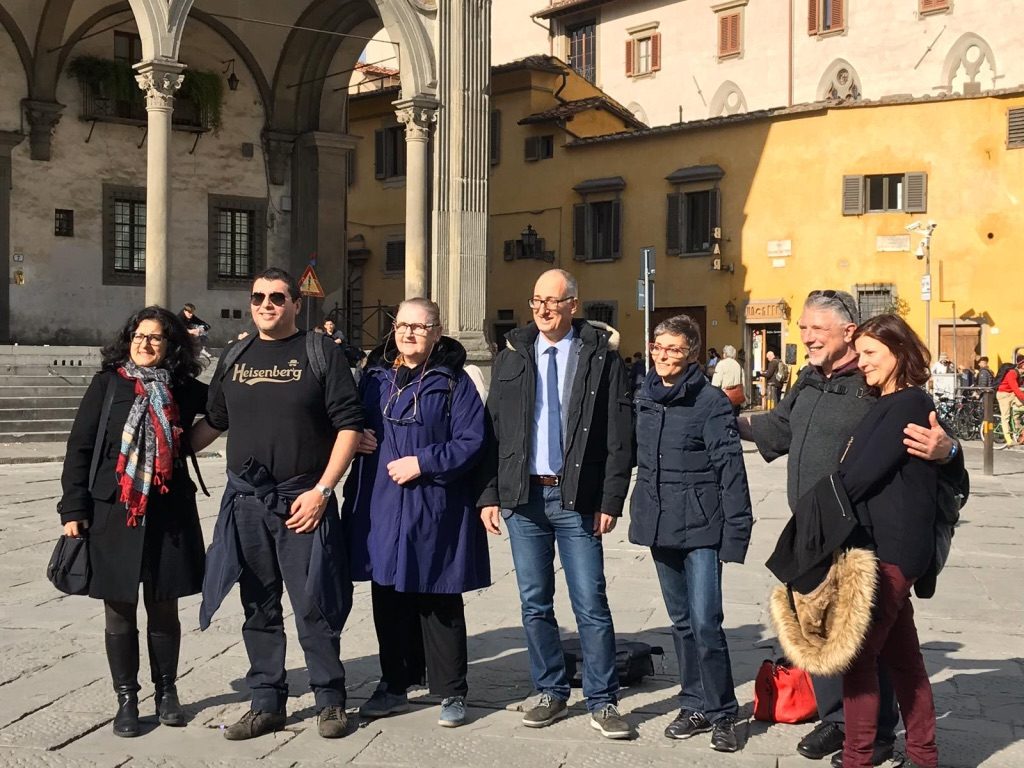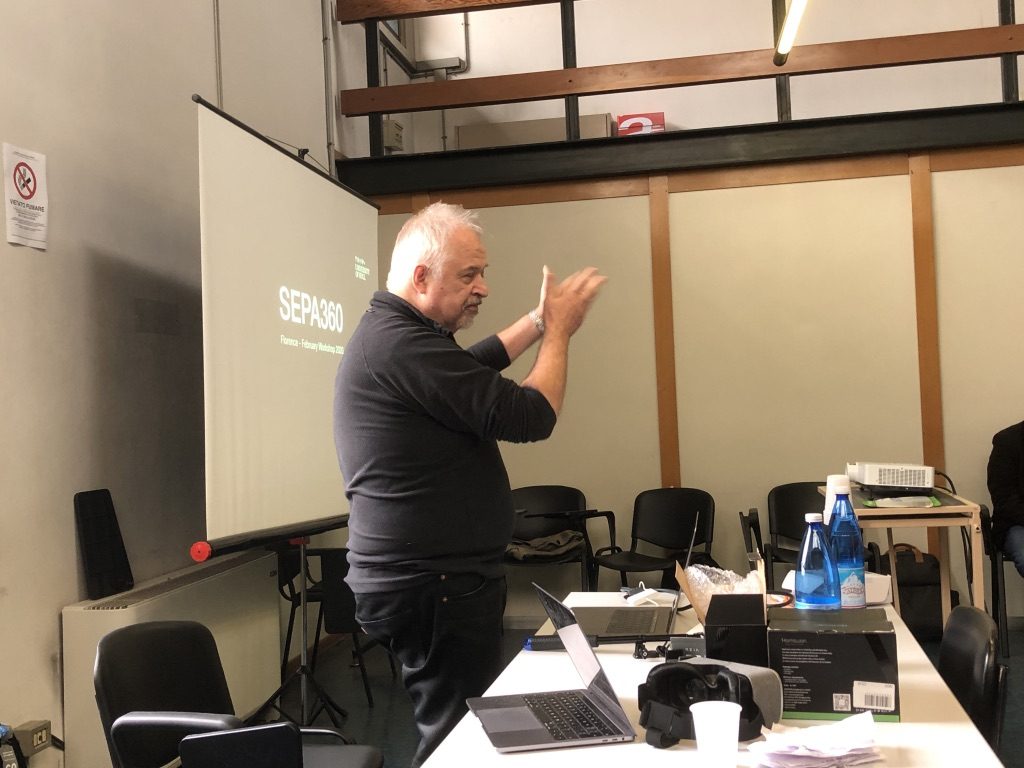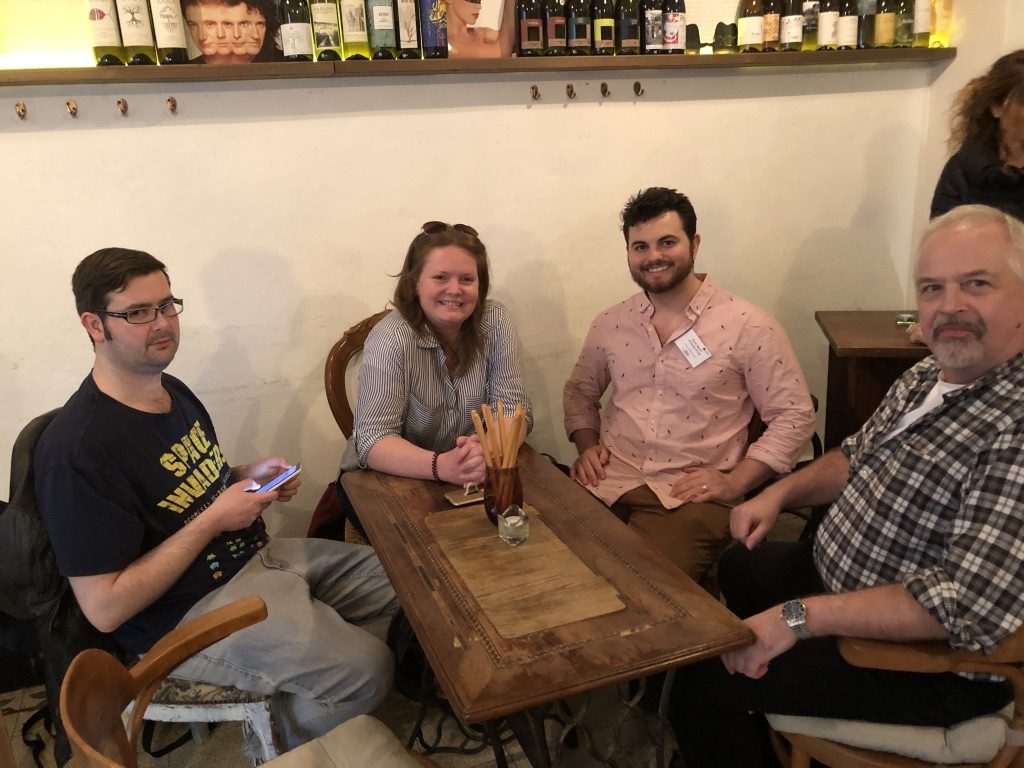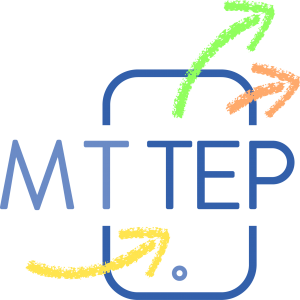360 video workshop in Florence
Learning and Teaching event
This week (February, 2020) our digital champions in the University of Hull visited Florence in Italy to participate in the first Learning and Teaching event of the SEPA360 project (Supporting Educators Pedagogical Activities with 360 video). The event brought together academics and researchers from the University of Hull (UK), the University of Florence (Italy), the University of Thessaloniki (Greece) and PXL College, Belgium , the four University partners in a new Erasmus+ Key Action 2 project led by Professor Kevin Burden from the University of Hull.

The event was organised to support newcomers, unfamiliar with the opportunities afforded by 360 video, to learn how to use this new technology to create new and exciting 360 videos to support their students’ learning. The aim of the project is to demonstrate how the use of 360 video can support students to learn more effectively, particularly in new or unfamiliar contexts. In this respect our digital champions are drawn from a diverse range of different disciplines and academic backgrounds.
Our digital champions


During this three day event our digital champions were set the task to design and develop their own 360 video learning scenario which including making a video outside in Florence itself. One example, which captures many of the potential affordances of the technology, was created by Dr. Chris Skinner who investigated the catastrophic flooding of Florence in 1966. You can see his finished video here
Associate Partner colleges
Although we could not accommodate all of our partner colleges in this particular workshop, each of the colleges was named in the application for funding and each is an Associate Partner in the project. We anticipate that during the course of this three year project our associate partners and more colleagues in the University of Hull itself, will grasp the many opportunities offered to learn about and use this innovative technology to support their students. To start this process the Digital Technologies Network is organising a workshop event on 5th June, 2020 where we will showcase some of the examples from Florence and start to consider how e build greater capacity and capability in both the colleges and university. Please contact us if you are interested in attending this event
New Erasmus+ Project: Designing and Evaluating Innovative Mobile Pedagogies (DEIMP), 2017-2020

DEIMP project partners
When appropriately utilised, mobile technologies have the potential to transform educational practices and are capable of making a significant contribution in engaging students and making learning clearer and more inclusive.
Therefore there is an urgent need to develop R&D oriented partnerships between university based teacher educators, school teachers and school leaders in order to design, develop, test and refine innovative pedagogies using mobile technologies.
In the context of an Erasmus+ KA2 application the University of Hull (UK), National University of Ireland (Galway), PXL Hogeschool (Belgium), Hogeschool Inholland (The Netherlands), Centre for Advancement of Research and Development in Educational Technology (Cyprus), Technology Enhanced Lifelong Learning Consult (The Netherlands) and the University of Technology in Sydney (Australia) set out series of activities to achieve this ambition centred on the collaborative construction of a mobile app to support the developing and evaluation of innovative mobile pedagogies, designed and tested between the partners and a network of 24 associated partner schools working as part of a transnational network.
.
The Final Learning, Teaching and Training Event for the MTTEP project – Hull University (June 2017)
The final event in the MTTEP project took place in Hull from June 19-24th, 2017, which included a one day conference co-badged with the Digital Technologies Network and ITTE.
The Mobilising and Transforming Teacher Educator’s Pedagogies project (MTTEP)
2016-2017 is the third and final year of the MTTEP project which will culminate in a major international conference to be held in Hull(UK) from 19-23rd June 2017. This will feature the official launch of the Mobile Learning Teacher Educators network and will also feature a one day conference (June 21st 2017) when the project partners will share their outputs with the Hull University Federation of Colleges Digital Network and the ITTE association.
This promises to be an exciting final year for the project and one which will have major benefits for the Digital Network. It has already begun in earnest with delegates from across the world meeting up in Bergen, Norway for the project’s second multiplier event. You can find out more about the event and the papers/workshops that were presented by clicking here:

Participants attending the 2nd Multiplier Event for the MTTEP project (Bergen University College, Norway)
Find out more about the 2nd Multiplier Event: bergen, Norway September 2016
Progress on the Mobile Learning Toolkit
One of the major outputs from the MTTEp project is a mobile learning toolkit for teacher educators to support them in using and adopting mobile technologies in their practice. This is now well under development and you can get a preview of what it will look like and do from watching this video:
To view the Mobile Learning Toolkit in its development phase click here:
‘Through the periscope’ (January – February 2016)
This year the Initial Teacher Education team in the Faculty of Education has focused on helping students (trainee teachers) to author their own e-Books using a variety of simple authoring tools on their iPads. these include Book Creator, Creative Book Builder, Explain Everything and iBook Author.
As part of the ‘Through the Periscope’ we are showing case the work of these students and explaining how it was produced, and why this is valuable. Through January and the early part of February 2016 we will post a series of short video screencasts that explain our project. This will culminate in February (23rd) with a live online seminar using Google Hangouts when we will be available to answer questions and talk about possible collaboration.
We start this week with a short video by Dr. Kevin Burden, the project leader, who explains the background to the project and why it is important. This will be followed in week 2 (18th January) with another video which explains how students made the eBooks
The Technology Enhanced Learning (TEL) team provide a single point of contact for a service intended to help staff use technology to enhance the student learning experience at the University by working with staff to show them what technologies are available and how they can help improve the student learning experience.
The TEL team can advise on:
- Effective use of technology, including eBridge, Lecture Capture software, PebblePad, Turnitin and TurningPoint in teaching and assessing
- Using social media in teaching and assessing
- Curriculum design and development of online programmes
- Designing learning materials
- Producing online learning content
In addition, the TEL team contribute to development of University policy, undertake research and development activity plus engage with a range of internal and external projects and networks. The TEL team also provide staff training and development on using technology and contribute to the PCAP programme.
Members of the TEL team work with individual and group members of staff on using technology to enhance the student learning experience in a number of ways, including house calls and collaboration on specific projects. This work is tailored to users’ needs, often based on their technical ability and pedagogical application of technology.

Programme Director for the Taught Doctorate in Education (EdD) and Reader in Educational Technology
Department of Education Studies
Professor Kevin Burden is the Director of the Taught Doctorate in Education (EdD) and is also a professor in Educational Technology in the Faculty of Education. He leads the Technology Enhanced Learning (TEL) research group and has a key responsibility for promoting and embedding the use of digital technologies in teaching and learning across the faculty. Kevin taught in various secondary schools across the country for nineteen years before joining the University of Hull in 1999. He completed an MA at the Institute of Education, University of London in 1986 and completed his PhD thesis in 2012 at the University of Hull, exploring the transformative impact of Web 2.0 technologies on teachers’ professional learning. He has held numerous roles and responsibilities whilst at the University of Hull including history mentor on the PGCE secondary programme; CPD co-ordinator for the Centre for Educational Studies; Director of the University of Hull’s New Opportunity Fund Training programme; Director of Cascade Multimedia Training and Evaluation Unit; and Programme Director for the Postgraduate Masters programme in the Faculty.
Video Case Study



Pingback: Creative Assessment in the English Literature degree: Towards Criteria for Assessment | English Subject Centre Archive